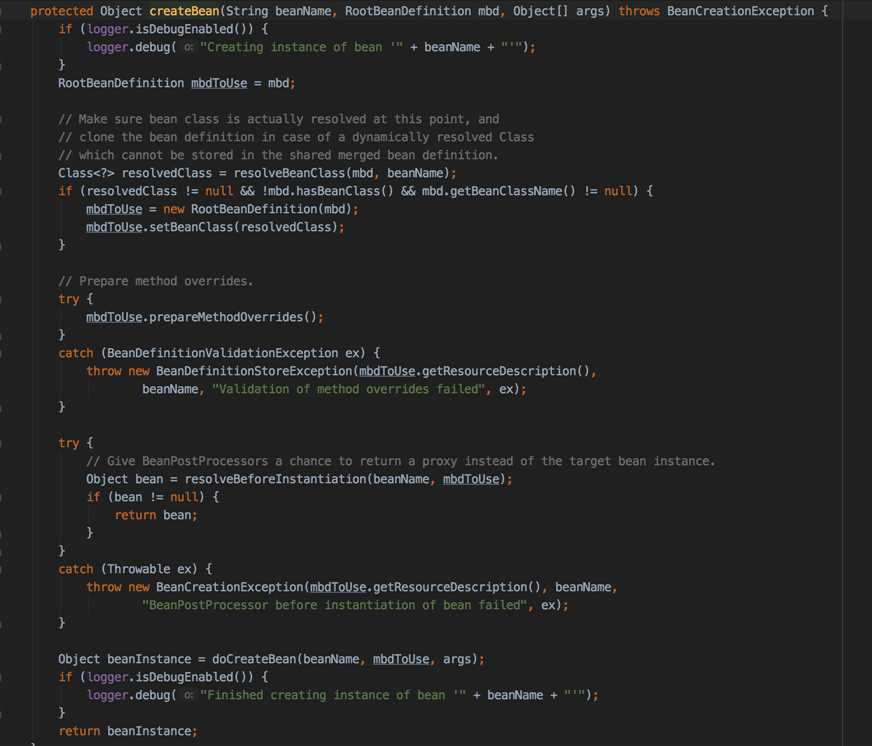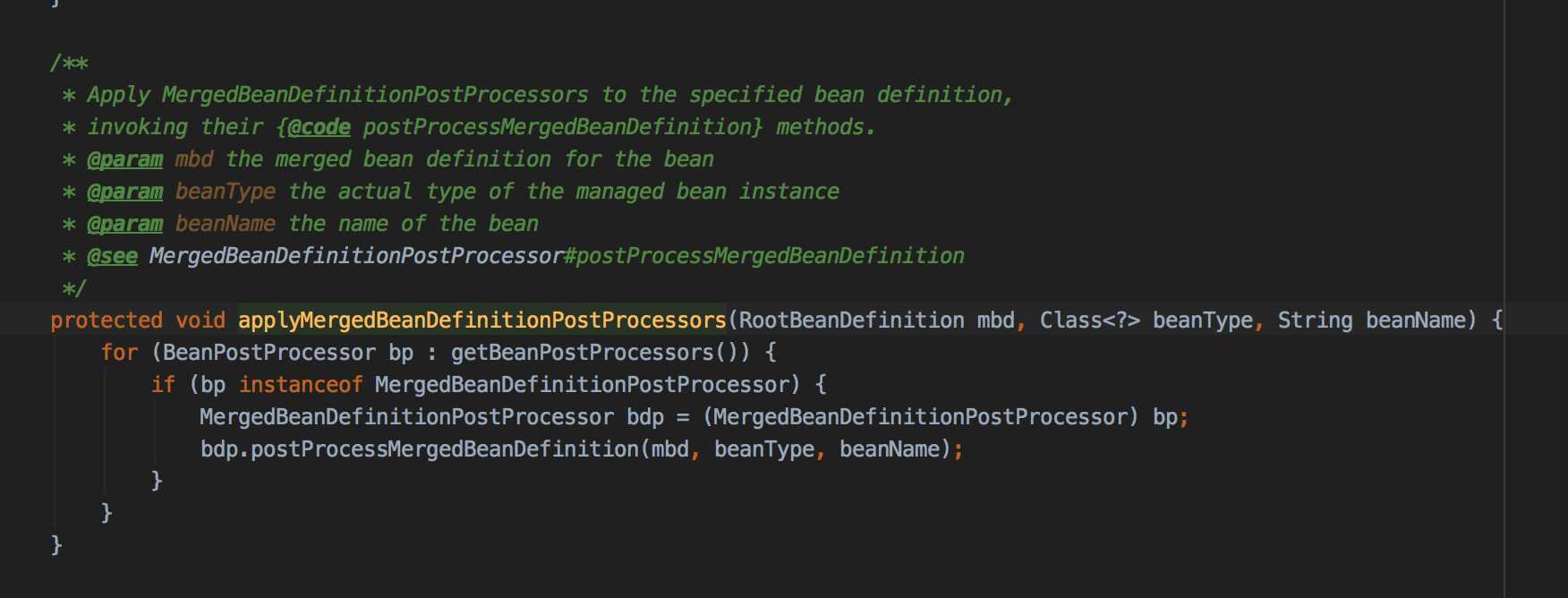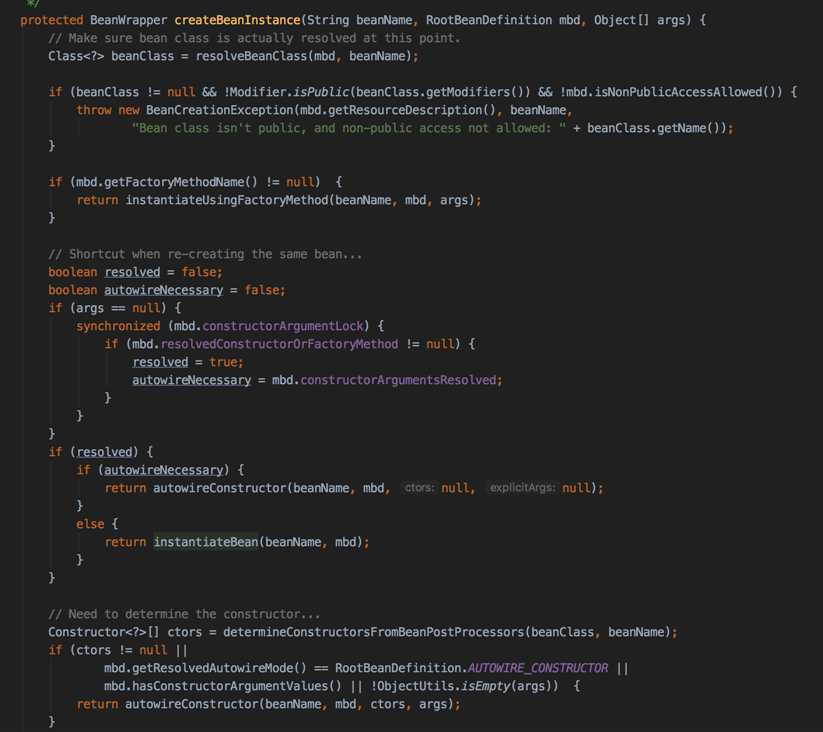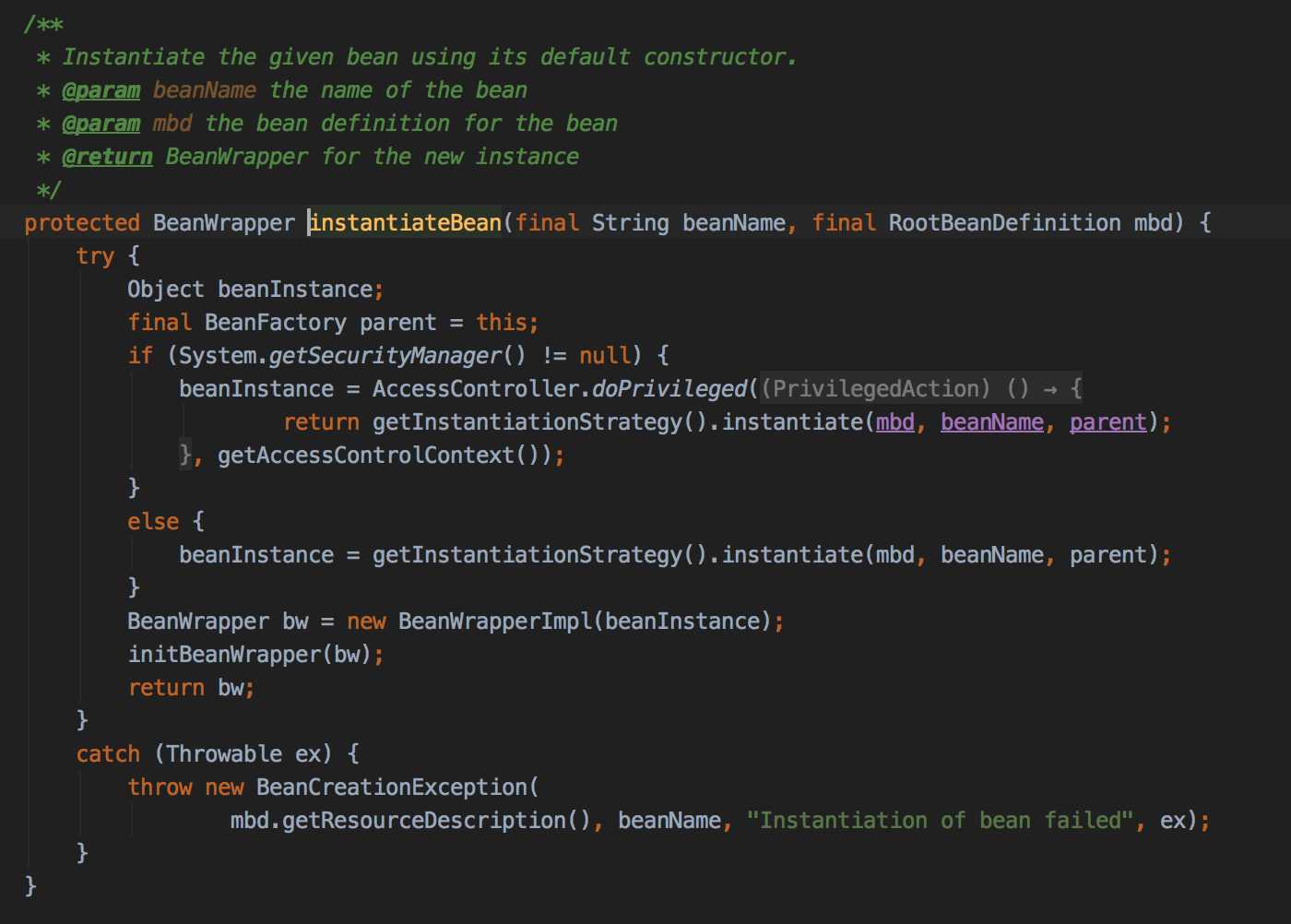标签:after modify xposed cab 递归 get override active oid
IOC容器的初始化完成的主要工作是在IOC容器中建立BeanDefinition数据映射。在此过程中并没有看到IOC容器对Bean依赖关系进行注入。
注意到依赖注入的过程是用户第一次向IOC容器索要Bean时触发的。当然也有例外,也就是我们可以在BeanDefinition信息中通过控制lazy-init属性来让容器完成对Bean的预实例化。
BeanFactory中的getBean接口的实现就是触发依赖注入的地方。
AbstractBeanFactory的实现:
final String beanName = transformedBeanName(name); Object bean; // Eagerly check singleton cache for manually registered singletons. Object sharedInstance = getSingleton(beanName); if (sharedInstance != null && args == null) { if (logger.isDebugEnabled()) { if (isSingletonCurrentlyInCreation(beanName)) { logger.debug("Returning eagerly cached instance of singleton bean ‘" + beanName + "‘ that is not fully initialized yet - a consequence of a circular reference"); } else { logger.debug("Returning cached instance of singleton bean ‘" + beanName + "‘"); } } bean = getObjectForBeanInstance(sharedInstance, name, beanName, null); } else { // Fail if we‘re already creating this bean instance: // We‘re assumably within a circular reference. if (isPrototypeCurrentlyInCreation(beanName)) { throw new BeanCurrentlyInCreationException(beanName); } // Check if bean definition exists in this factory. BeanFactory parentBeanFactory = getParentBeanFactory(); if (parentBeanFactory != null && !containsBeanDefinition(beanName)) { // Not found -> check parent. String nameToLookup = originalBeanName(name); if (args != null) { // Delegation to parent with explicit args. return (T) parentBeanFactory.getBean(nameToLookup, args); } else { // No args -> delegate to standard getBean method. return parentBeanFactory.getBean(nameToLookup, requiredType); } } if (!typeCheckOnly) { markBeanAsCreated(beanName); } try { final RootBeanDefinition mbd = getMergedLocalBeanDefinition(beanName); checkMergedBeanDefinition(mbd, beanName, args); // Guarantee initialization of beans that the current bean depends on. String[] dependsOn = mbd.getDependsOn(); if (dependsOn != null) { for (String dep : dependsOn) { if (isDependent(beanName, dep)) { throw new BeanCreationException(mbd.getResourceDescription(), beanName, "Circular depends-on relationship between ‘" + beanName + "‘ and ‘" + dep + "‘"); } registerDependentBean(dep, beanName); getBean(dep); } } // Create bean instance. if (mbd.isSingleton()) { sharedInstance = getSingleton(beanName, new ObjectFactory<Object>() { @Override public Object getObject() throws BeansException { try { return createBean(beanName, mbd, args); } catch (BeansException ex) { // Explicitly remove instance from singleton cache: It might have been put there // eagerly by the creation process, to allow for circular reference resolution. // Also remove any beans that received a temporary reference to the bean. destroySingleton(beanName); throw ex; } } }); bean = getObjectForBeanInstance(sharedInstance, name, beanName, mbd); } else if (mbd.isPrototype()) { // It‘s a prototype -> create a new instance. Object prototypeInstance = null; try { beforePrototypeCreation(beanName); prototypeInstance = createBean(beanName, mbd, args); } finally { afterPrototypeCreation(beanName); } bean = getObjectForBeanInstance(prototypeInstance, name, beanName, mbd); } else { String scopeName = mbd.getScope(); final Scope scope = this.scopes.get(scopeName); if (scope == null) { throw new IllegalStateException("No Scope registered for scope name ‘" + scopeName + "‘"); } try { Object scopedInstance = scope.get(beanName, new ObjectFactory<Object>() { @Override public Object getObject() throws BeansException { beforePrototypeCreation(beanName); try { return createBean(beanName, mbd, args); } finally { afterPrototypeCreation(beanName); } } }); bean = getObjectForBeanInstance(scopedInstance, name, beanName, mbd); } catch (IllegalStateException ex) { throw new BeanCreationException(beanName, "Scope ‘" + scopeName + "‘ is not active for the current thread; consider " + "defining a scoped proxy for this bean if you intend to refer to it from a singleton", ex); } } } catch (BeansException ex) { cleanupAfterBeanCreationFailure(beanName); throw ex; } } // Check if required type matches the type of the actual bean instance. if (requiredType != null && bean != null && !requiredType.isAssignableFrom(bean.getClass())) { try { return getTypeConverter().convertIfNecessary(bean, requiredType); } catch (TypeMismatchException ex) { if (logger.isDebugEnabled()) { logger.debug("Failed to convert bean ‘" + name + "‘ to required type ‘" + ClassUtils.getQualifiedName(requiredType) + "‘", ex); } throw new BeanNotOfRequiredTypeException(name, requiredType, bean.getClass()); } } return (T) bean; }
AbstractAutowireCapableBeanFactory实现了createBean

注意resolveBeforeInstantiation方法,如果配置了PostProcessor,那么这里返回的是一个proxy
接着到doCreateBean中看看Bean是怎样生成的:
protected Object doCreateBean(final String beanName, final RootBeanDefinition mbd, final Object[] args) throws BeanCreationException { // Instantiate the bean. BeanWrapper instanceWrapper = null; if (mbd.isSingleton()) { instanceWrapper = this.factoryBeanInstanceCache.remove(beanName); } if (instanceWrapper == null) { instanceWrapper = createBeanInstance(beanName, mbd, args); } final Object bean = (instanceWrapper != null ? instanceWrapper.getWrappedInstance() : null); Class<?> beanType = (instanceWrapper != null ? instanceWrapper.getWrappedClass() : null); mbd.resolvedTargetType = beanType; // Allow post-processors to modify the merged bean definition. synchronized (mbd.postProcessingLock) { if (!mbd.postProcessed) { try { applyMergedBeanDefinitionPostProcessors(mbd, beanType, beanName); } catch (Throwable ex) { throw new BeanCreationException(mbd.getResourceDescription(), beanName, "Post-processing of merged bean definition failed", ex); } mbd.postProcessed = true; } } // Eagerly cache singletons to be able to resolve circular references // even when triggered by lifecycle interfaces like BeanFactoryAware. boolean earlySingletonExposure = (mbd.isSingleton() && this.allowCircularReferences && isSingletonCurrentlyInCreation(beanName)); if (earlySingletonExposure) { if (logger.isDebugEnabled()) { logger.debug("Eagerly caching bean ‘" + beanName + "‘ to allow for resolving potential circular references"); } addSingletonFactory(beanName, new ObjectFactory<Object>() { @Override public Object getObject() throws BeansException { return getEarlyBeanReference(beanName, mbd, bean); } }); } // Initialize the bean instance. Object exposedObject = bean; try { populateBean(beanName, mbd, instanceWrapper); if (exposedObject != null) { exposedObject = initializeBean(beanName, exposedObject, mbd); } } catch (Throwable ex) { if (ex instanceof BeanCreationException && beanName.equals(((BeanCreationException) ex).getBeanName())) { throw (BeanCreationException) ex; } else { throw new BeanCreationException( mbd.getResourceDescription(), beanName, "Initialization of bean failed", ex); } } if (earlySingletonExposure) { Object earlySingletonReference = getSingleton(beanName, false); if (earlySingletonReference != null) { if (exposedObject == bean) { exposedObject = earlySingletonReference; } else if (!this.allowRawInjectionDespiteWrapping && hasDependentBean(beanName)) { String[] dependentBeans = getDependentBeans(beanName); Set<String> actualDependentBeans = new LinkedHashSet<String>(dependentBeans.length); for (String dependentBean : dependentBeans) { if (!removeSingletonIfCreatedForTypeCheckOnly(dependentBean)) { actualDependentBeans.add(dependentBean); } } if (!actualDependentBeans.isEmpty()) { throw new BeanCurrentlyInCreationException(beanName, "Bean with name ‘" + beanName + "‘ has been injected into other beans [" + StringUtils.collectionToCommaDelimitedString(actualDependentBeans) + "] in its raw version as part of a circular reference, but has eventually been " + "wrapped. This means that said other beans do not use the final version of the " + "bean. This is often the result of over-eager type matching - consider using " + "‘getBeanNamesOfType‘ with the ‘allowEagerInit‘ flag turned off, for example."); } } } } // Register bean as disposable. try { registerDisposableBeanIfNecessary(beanName, bean, mbd); } catch (BeanDefinitionValidationException ex) { throw new BeanCreationException( mbd.getResourceDescription(), beanName, "Invalid destruction signature", ex); } return exposedObject; }
BeanWrapper是用来持有创建出来的Bean对象的。
applyMergedBeanDefinitionPostProcessors


createBeanInstance创建Bean
从exposedObject开始对bean进行初始化,依赖注入往往发生在这里,在初始化处理完以后会返回作为依赖注入完成后的Bean。
在最后的registerDisposableBeanIfNecessary中对单例bean 注册DisposableBean接口
与依赖注入关系特别密切的方法有
createBeanInstance和populateBean


instantiateBean中使用CGLIB来对Bean进行实例化。
下面来看一下Bean对象生成以后,怎样把这些对象的依赖关系设置好。完成整个依赖注入过程。回到前面的populateBean
protected void populateBean(String beanName, RootBeanDefinition mbd, BeanWrapper bw) { PropertyValues pvs = mbd.getPropertyValues(); if (bw == null) { if (!pvs.isEmpty()) { throw new BeanCreationException( mbd.getResourceDescription(), beanName, "Cannot apply property values to null instance"); } else { // Skip property population phase for null instance. return; } } // Give any InstantiationAwareBeanPostProcessors the opportunity to modify the // state of the bean before properties are set. This can be used, for example, // to support styles of field injection. boolean continueWithPropertyPopulation = true; if (!mbd.isSynthetic() && hasInstantiationAwareBeanPostProcessors()) { for (BeanPostProcessor bp : getBeanPostProcessors()) { if (bp instanceof InstantiationAwareBeanPostProcessor) { InstantiationAwareBeanPostProcessor ibp = (InstantiationAwareBeanPostProcessor) bp; if (!ibp.postProcessAfterInstantiation(bw.getWrappedInstance(), beanName)) { continueWithPropertyPopulation = false; break; } } } } if (!continueWithPropertyPopulation) { return; } if (mbd.getResolvedAutowireMode() == RootBeanDefinition.AUTOWIRE_BY_NAME || mbd.getResolvedAutowireMode() == RootBeanDefinition.AUTOWIRE_BY_TYPE) { MutablePropertyValues newPvs = new MutablePropertyValues(pvs); // Add property values based on autowire by name if applicable. if (mbd.getResolvedAutowireMode() == RootBeanDefinition.AUTOWIRE_BY_NAME) { autowireByName(beanName, mbd, bw, newPvs); } // Add property values based on autowire by type if applicable. if (mbd.getResolvedAutowireMode() == RootBeanDefinition.AUTOWIRE_BY_TYPE) { autowireByType(beanName, mbd, bw, newPvs); } pvs = newPvs; } boolean hasInstAwareBpps = hasInstantiationAwareBeanPostProcessors(); boolean needsDepCheck = (mbd.getDependencyCheck() != RootBeanDefinition.DEPENDENCY_CHECK_NONE); if (hasInstAwareBpps || needsDepCheck) { PropertyDescriptor[] filteredPds = filterPropertyDescriptorsForDependencyCheck(bw, mbd.allowCaching); if (hasInstAwareBpps) { for (BeanPostProcessor bp : getBeanPostProcessors()) { if (bp instanceof InstantiationAwareBeanPostProcessor) { InstantiationAwareBeanPostProcessor ibp = (InstantiationAwareBeanPostProcessor) bp; pvs = ibp.postProcessPropertyValues(pvs, filteredPds, bw.getWrappedInstance(), beanName); if (pvs == null) { return; } } } } if (needsDepCheck) { checkDependencies(beanName, mbd, filteredPds, pvs); } } applyPropertyValues(beanName, mbd, bw, pvs); }
在这里留了一个InstantiationAwareBeanPostProcessors的扩展点。并且在处理之后直接退出了。否则在按类型注入(autowireByName)和按名称注入(autowireByType)之后对属性进行注入.
/** * Apply the given property values, resolving any runtime references * to other beans in this bean factory. Must use deep copy, so we * don‘t permanently modify this property. * @param beanName the bean name passed for better exception information * @param mbd the merged bean definition * @param bw the BeanWrapper wrapping the target object * @param pvs the new property values */ protected void applyPropertyValues(String beanName, BeanDefinition mbd, BeanWrapper bw, PropertyValues pvs) { if (pvs == null || pvs.isEmpty()) { return; } MutablePropertyValues mpvs = null; List<PropertyValue> original; if (System.getSecurityManager() != null) { if (bw instanceof BeanWrapperImpl) { ((BeanWrapperImpl) bw).setSecurityContext(getAccessControlContext()); } } if (pvs instanceof MutablePropertyValues) { mpvs = (MutablePropertyValues) pvs; if (mpvs.isConverted()) { // Shortcut: use the pre-converted values as-is. try { bw.setPropertyValues(mpvs); return; } catch (BeansException ex) { throw new BeanCreationException( mbd.getResourceDescription(), beanName, "Error setting property values", ex); } } original = mpvs.getPropertyValueList(); } else { original = Arrays.asList(pvs.getPropertyValues()); } TypeConverter converter = getCustomTypeConverter(); if (converter == null) { converter = bw; } BeanDefinitionValueResolver valueResolver = new BeanDefinitionValueResolver(this, beanName, mbd, converter); // Create a deep copy, resolving any references for values. List<PropertyValue> deepCopy = new ArrayList<PropertyValue>(original.size()); boolean resolveNecessary = false; for (PropertyValue pv : original) { if (pv.isConverted()) { deepCopy.add(pv); } else { String propertyName = pv.getName(); Object originalValue = pv.getValue(); Object resolvedValue = valueResolver.resolveValueIfNecessary(pv, originalValue); Object convertedValue = resolvedValue; boolean convertible = bw.isWritableProperty(propertyName) && !PropertyAccessorUtils.isNestedOrIndexedProperty(propertyName); if (convertible) { convertedValue = convertForProperty(resolvedValue, propertyName, bw, converter); } // Possibly store converted value in merged bean definition, // in order to avoid re-conversion for every created bean instance. if (resolvedValue == originalValue) { if (convertible) { pv.setConvertedValue(convertedValue); } deepCopy.add(pv); } else if (convertible && originalValue instanceof TypedStringValue && !((TypedStringValue) originalValue).isDynamic() && !(convertedValue instanceof Collection || ObjectUtils.isArray(convertedValue))) { pv.setConvertedValue(convertedValue); deepCopy.add(pv); } else { resolveNecessary = true; deepCopy.add(new PropertyValue(pv, convertedValue)); } } } if (mpvs != null && !resolveNecessary) { mpvs.setConverted(); } // Set our (possibly massaged) deep copy. try { bw.setPropertyValues(new MutablePropertyValues(deepCopy)); } catch (BeansException ex) { throw new BeanCreationException( mbd.getResourceDescription(), beanName, "Error setting property values", ex); } }
看一下valueResolver.resolveValueIfNecessary(pv, originalValue);
/** * Given a PropertyValue, return a value, resolving any references to other * beans in the factory if necessary. The value could be: * <li>A BeanDefinition, which leads to the creation of a corresponding * new bean instance. Singleton flags and names of such "inner beans" * are always ignored: Inner beans are anonymous prototypes. * <li>A RuntimeBeanReference, which must be resolved. * <li>A ManagedList. This is a special collection that may contain * RuntimeBeanReferences or Collections that will need to be resolved. * <li>A ManagedSet. May also contain RuntimeBeanReferences or * Collections that will need to be resolved. * <li>A ManagedMap. In this case the value may be a RuntimeBeanReference * or Collection that will need to be resolved. * <li>An ordinary object or {@code null}, in which case it‘s left alone. * @param argName the name of the argument that the value is defined for * @param value the value object to resolve * @return the resolved object */ public Object resolveValueIfNecessary(Object argName, Object value) { // We must check each value to see whether it requires a runtime reference // to another bean to be resolved. if (value instanceof RuntimeBeanReference) { RuntimeBeanReference ref = (RuntimeBeanReference) value; return resolveReference(argName, ref); } else if (value instanceof RuntimeBeanNameReference) { String refName = ((RuntimeBeanNameReference) value).getBeanName(); refName = String.valueOf(doEvaluate(refName)); if (!this.beanFactory.containsBean(refName)) { throw new BeanDefinitionStoreException( "Invalid bean name ‘" + refName + "‘ in bean reference for " + argName); } return refName; } else if (value instanceof BeanDefinitionHolder) { // Resolve BeanDefinitionHolder: contains BeanDefinition with name and aliases. BeanDefinitionHolder bdHolder = (BeanDefinitionHolder) value; return resolveInnerBean(argName, bdHolder.getBeanName(), bdHolder.getBeanDefinition()); } else if (value instanceof BeanDefinition) { // Resolve plain BeanDefinition, without contained name: use dummy name. BeanDefinition bd = (BeanDefinition) value; String innerBeanName = "(inner bean)" + BeanFactoryUtils.GENERATED_BEAN_NAME_SEPARATOR + ObjectUtils.getIdentityHexString(bd); return resolveInnerBean(argName, innerBeanName, bd); } else if (value instanceof ManagedArray) { // May need to resolve contained runtime references. ManagedArray array = (ManagedArray) value; Class<?> elementType = array.resolvedElementType; if (elementType == null) { String elementTypeName = array.getElementTypeName(); if (StringUtils.hasText(elementTypeName)) { try { elementType = ClassUtils.forName(elementTypeName, this.beanFactory.getBeanClassLoader()); array.resolvedElementType = elementType; } catch (Throwable ex) { // Improve the message by showing the context. throw new BeanCreationException( this.beanDefinition.getResourceDescription(), this.beanName, "Error resolving array type for " + argName, ex); } } else { elementType = Object.class; } } return resolveManagedArray(argName, (List<?>) value, elementType); } else if (value instanceof ManagedList) { // May need to resolve contained runtime references. return resolveManagedList(argName, (List<?>) value); } else if (value instanceof ManagedSet) { // May need to resolve contained runtime references. return resolveManagedSet(argName, (Set<?>) value); } else if (value instanceof ManagedMap) { // May need to resolve contained runtime references. return resolveManagedMap(argName, (Map<?, ?>) value); } else if (value instanceof ManagedProperties) { Properties original = (Properties) value; Properties copy = new Properties(); for (Map.Entry<Object, Object> propEntry : original.entrySet()) { Object propKey = propEntry.getKey(); Object propValue = propEntry.getValue(); if (propKey instanceof TypedStringValue) { propKey = evaluate((TypedStringValue) propKey); } if (propValue instanceof TypedStringValue) { propValue = evaluate((TypedStringValue) propValue); } copy.put(propKey, propValue); } return copy; } else if (value instanceof TypedStringValue) { // Convert value to target type here. TypedStringValue typedStringValue = (TypedStringValue) value; Object valueObject = evaluate(typedStringValue); try { Class<?> resolvedTargetType = resolveTargetType(typedStringValue); if (resolvedTargetType != null) { return this.typeConverter.convertIfNecessary(valueObject, resolvedTargetType); } else { return valueObject; } } catch (Throwable ex) { // Improve the message by showing the context. throw new BeanCreationException( this.beanDefinition.getResourceDescription(), this.beanName, "Error converting typed String value for " + argName, ex); } } else { return evaluate(value); } }
整个解析完成之后,已经为依赖注入准备好了条件,依赖注入的发生是在BeanWrapper的setPropertyValue中实现的,具体的完成是BeanWrapper的子类
注入的过程又分为了对集合属性的注入和 对非集合类的域进行的注入。
注意2个递归::
1.一个递归是在上下文体系中查找需要的Bean和创建Bean的递归调用
2.另一个递归是在依赖注入时,通过递归调用容器的getBean方法。
标签:after modify xposed cab 递归 get override active oid
原文地址:https://www.cnblogs.com/lccsblog/p/12128620.html